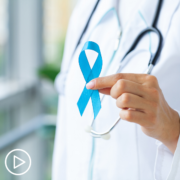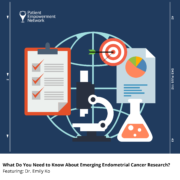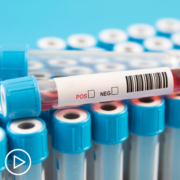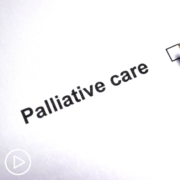Updates in Prostate Cancer Treatment and Research | What You Need to Know
Updates in Prostate Cancer Treatment and Research | What You Need to Know from Patient Empowerment Network on Vimeo.
With research evolving quickly, it’s more important than ever that people with prostate cancer take an active role in their care. Dr. Channing Paller shares an update on recent prostate care treatment advances, discusses essential testing–including genetic testing–and provides advice for self-advocacy.
Channing Paller, MD is the Director of Prostate Cancer Clinical Research at Johns Hopkins Medicine. Learn more about this Dr. Paller.
See More From INSIST! Prostate Cancer
Related Resources
Transcript:
Katherine:
Hello, and welcome. I’m Katherine Banwell. Your host. Today’s program focuses on helping patients with advanced prostate cancer insist on better care. We’re going to discuss the latest research, current treatments, and how patients can collaborate with their healthcare team on key decisions.
Before we meet our guest, let’s review a few important details. The reminder email you received about this program contains a link to program materials. If you haven’t already, click that link to access information to follow along during the webinar.
At the end of this program, you’ll receive another link to a program survey. Please take a moment to provide feedback about your experience today, in order to help us plan future webinars. And finally, before we get into the discussion, please remember that this program is not a substitute for seeking medical advice. Please refer to your healthcare team about what might be best for you.
Well, let’s meet our guest today. Joining me is Dr. Channing Paller. Dr. Paller, welcome. Would you please introduce yourself?
Dr. Paller:
Thank you, Katherine. I’m delighted to be here today. My name is Channing Paller. I’m Associate Professor of Oncology at Johns Hopkins and the director of Prostate Cancer Clinical Research.
Katherine:
Thank you so much for taking the time to join us today.
Dr. Paller:
Thank you for having me.
Katherine:
Dr. Paller, in June, prostate cancer researchers from around the world met to discuss their findings at the annual American Society of Clinical Oncology, or ASCO meeting, in Chicago. Would you walk us through the highlights from that meeting that patients should know about?
Dr. Paller:
Absolutely. We’ve had a exciting time for prostate cancer in June. So, I’d say, the first thing I would bring up is, the PEACE-1 trial was discussed again, and more data came out from that trial. That trial originally supported what we found, the STAMPEDE trial, to say, yes, we should add abiraterone to androgen deprivation therapy and chemotherapy in helping de novo metastatic patients live longer and do better overall. And it also, this time around, showed us that combining abiraterone (Zytiga) with radiation, plus or minus chemo, had patients do better. So, they had a longer progression-free survival, or metastasis-free survival.
And also, the neat thing was, patients had fewer local symptoms in the long run. So, it prevented catheters being needed later, prevented blockages. It prevented local side effects from their cancer, which was really terrific to know, because that helps with patients’ quality of life.
That was one of the main, personally. Go ahead.
Katherine:
Yeah, I was just going to ask, anything else?
Dr. Paller:
Yes. So, the second big headline, which is one of my dear loves, is all of the PARP inhibitor data. So, there were a couple trials presented, and this month has been terrific in terms of, there have been two drug approvals. So, let me talk through a couple of those.
So, one of the big ones that was presented at ASCO was looking at talazoparib (Talzenna) and enzalutamide (Xtandi) in patients with metastatic castration-resistant prostate cancer, and it showed that the combination of those two drugs helped patients do better than enzalutamide alone, in that setting. What was also interesting is a subset of patients with DNA repair mutations did even better.
June 20th, the FDA approved that combination for patients with metastatic castration-resistant prostate cancer with DNA repair mutations.
We also had a drug approval for abiraterone (Zytiga) and olaparib (Lynparza) in the same space of metastatic castration-resistant prostate cancer for patients with BRCA mutations. That was a more narrow approval, but it was still very important.
And what’s exciting here is, we’re really learning more about targeted therapy, precision medicine, for our prostate cancer patients. When I started treating prostate cancer patients back in 2005, the main drug approved was chemotherapy, docetaxel (Taxotere), and hormone deprivation therapy. And in the last almost 20 years, or 18 years, we’ve had 10 drug approvals, and we’re really starting to have multiple drugs approved based on people’s genetics.
Katherine:
That’s such promising news. I mentioned at the top of the program that our focus for this webinar is advanced prostate cancer. So, I’d like you to define that. What is advanced prostate cancer? And is any of the research you mentioned focused on this stage of disease?
Dr. Paller:
Well, advanced prostate cancer includes any prostate cancer that was extended outside the prostate, really, that’s spread to the nodes, even to the lymph nodes, to the liver, to the lungs, to the bones. And so, we have a lot of new findings, looking at this space, and that was a lot of what they showed at the ASCO conference.
The other thing we’re learning is that we really want to get genetic testing on everybody. And so, in addition to your regular, “How do you feel?” “What do your labs show?” “What is your PSA doing?”
We also want to get imaging, right? So, we want to look at imaging, in terms of, what did your CT and bone scan show? And nowadays, we’re moving into PSMA, or prostate-specific membrane antigen, PET scans.
And so, that’s the new main way people look at where their prostate cancer has gone, and help them decide, what is the best treatment for me? Is it to get surgery locally, or has it advanced now, and I really need to do hormone therapy and radiation, or some other combination of systemic therapy, meaning more hormones, or more chemotherapy, with targeted therapies such as radiation?
Katherine:
Beyond ASCO, Dr. Paller, are there other research or treatment advances that patients should know about? Anything other than what you’ve mentioned already?
Dr. Paller:
Oh, yes. So, the other headline that I was really excited about at ASCO is watching medicine adopt the world of artificial intelligence. There was a great abstract, looking at how we can use artificial intelligence to look up pathology slides.
So, in the past, we would always want to go to a top academic center to have your pathology reviewed by a top expert and make sure we were treating the right cancer, and make sure we really understand your risk. What we’re finding is, we can create biomarkers, and we’re understanding not just genetic, genomic biomarkers, but also pathology biomarkers, and age, and PSA, and risk, and comorbidities, and we can combine them all together and use AI to help us better stratify patients.
And so, although it’s early, I think this is going to be an explosion in terms of helping us better define risk for patients in advanced prostate cancer, and help them figure out, do they need intensification of treatment, or can we de-intensify treatment? Can we not cause as much toxicity, and they’ll do just as well? And so, I was really excited to see that data as well.
Katherine:
How can patients stay up to date on evolving research?
Dr. Paller:
There are many ways to stay up to date. There are nice summaries at ASCO. There are nice summaries through the Prostate Cancer Foundation. There are good summaries at each of the institutions with whom you work.
One of my favorite ways to stay up to date on precision medicine is one of these registries that I am co-leading, which is called the PROMISE registry. This is a wonderful opportunity which was conceived in the pandemic.
And so, it’s pandemic friendly, and that is called the PROMISE registry. And what you can do is go to prostatecancerpromise.org and sign up if you have prostate cancer. And you say, “Hey, I have prostate cancer. This is my address. Please ship me a kit where I can do saliva testing of my genes.” And once you get your tests sent in, they’ll send you a kit, you send it back, you’ll get an email, and you can go over your results with a genetic counselor.
And then, once you get enrolled in this program, it is really just a free information source. And so, you can learn more about the clinical trials around the country for patients with different mutations. And so, I love that as, whether or not you have a mutation and you’re going to follow with us for 20 years, because we’re going to offer you opportunities and let you be the first to know about new drug approvals, you can still hear about all of the new research.
And I think that’s a wonderful, free resource that we’ve done for our patients to help them understand more about what’s out there. Another opportunity to learn more about prostate cancer is the prostate cancer clinical trial consortium. They have a nice website looking at germline genetics, looking at diversity, looking about clinical trial design. And so, there’s lots of different places to learn more about prostate cancer.
Katherine:
Dr. Paller, what about clinical trials? Why should patients consider enrolling, and what are the benefits for them?
Dr. Paller:
I like to tell my patients that once you have metastatic or advanced prostate cancer, we’re not doing placebo on you. If we’re doing placebo, it’s the standard of care plus a new drug, and we want to know if the new drug in combination with the old drug is better than the old drug alone.
And so, I find those patients heroes, in one sense, for the future, right? They’re helping to approve the new drugs of the future, and I also find, oftentimes, those are the patients that do best, because they’re getting to try all of the new drugs of the future before they’re approved. And so, I will have patients that are, I call them chronic trialists because they’ll go through all my new drugs before they’re even approved.
And I love it, and they love it, because they do better than the average, because they’re exploring all of the new therapies. And so, I find those patients heroes, and I really appreciate their efforts. I would say, the most important thing about clinical trials is learning about them, right? And being able to ask the questions. “Well, what phase is that trial?” So, Phase I is really testing safety, and finding the right dose for patients. And so, that’s usually a small number of patients, and looking exactly at, does this work? Do we have a biomarker to follow? What’s the best way to use this new drug?
Phase II starts to look at efficacy, as well as looking at side effects. And so, with Phase II, we really look at, what is the effect? Is it better than what we expected? Does it help these patients – is it better than some of the other drugs?
And then, Phase III are usually large trials that are looking at FDA approval. They’re looking for registration with the FDA, getting approval, and being the new standard of care that’s paid for by insurance companies.
Katherine:
I’d like to back up a bit and talk about the treatments that are currently available. Let’s start with surgery. What role does that play in treating advanced disease?
Dr. Paller:
Surgery is one of the key tools that we use when we’re trying to cure prostate cancer when it’s localized, or just starting to spread. But if it’s too advanced, meaning, spreading to the lymph nodes, we usually don’t recommend surgery. So, surgery is usually used for curative intents, although there is a trial ongoing now, looking at the same question of, is adding surgery to systemic therapy helpful in terms of long-term cure rate, in terms of decreased side effects later, and local symptoms later?
And so, we are asking that question. That is one of the ongoing clinical trials that we’re looking at right now, as a group.
Surgery is terrific. Radiation is terrific. Really working with your team to understand for you, what are the side effects that you would undergo? What are the risks and benefits of each modality that you would like to, or that you’re willing to tolerate? And so, I think the differences between surgery and radiation, for curing patients, are really something that you need to discuss with your provider. The risk of erectile dysfunction, the risk of the local symptoms from the radiation, the risk of having bleeding from your bladder, the risk of bowel problems. Those are all things that that you – urinary incontinence – that you need to discuss with your physician.
Katherine:
What are other options that are available now, for patients?
Dr. Paller:
For curative intent, the main two treatment options are surgery, radiation. Many people for very localized disease are trying other therapies, such as cryotherapy, and more focal therapies. But really, for curative, the standard is surgery or radiation. And as it gets more advanced, circling back to advanced prostate cancer, we are learning that combination therapy is better. So, adding pills like abiraterone, adding systemic therapies, help patients do better.
So, there’s a big, long list of therapies upfront that we use for metastatic hormone-sensitive prostate cancer. There’s abiraterone, there is apalutamide (Erleada), there’s enzalutamide, and now, darolutamide (Nubeqa).
And in fact, in fit patients that can tolerate chemotherapy for metastatic high-volume prostate cancer patients, we always recommend triple therapy, either with abiraterone, docetaxel, and ADT, or with darolutamide, docetaxel, and ADT, and these patients really seem to do better for longer. The other thing I would add is the PEACE-1 trial, which looked at abiraterone and docetaxel, found that patients would do best by adding growth factor support. And so, that is recommended.
The other thing I want to point out to patients is, I know we’re all eager to get started when we find out we have a diagnosis of metastatic prostate cancer, but sometimes, these therapies are quite tough on the system when you have a lot of cancer in your body, and my recommendation to everybody is, one thing at a time.
So, start the hormone therapy and wait at least 30 days, and in fact, in the PEACE-1 trial, they waited 45 days, right? That allows the testosterone levels to fall, it allows you to adjust to the side effects of hormone deprivation therapy, and it allows your body to be ready for the next line of therapy. And you can add the ADT to second line, such as abiraterone or daro during that time, but not adding the chemo all at once, that really makes a difference.
I find, unfortunately, when patients and their providers don’t follow those strict criteria, as they did in the trial, meaning they start chemo and abiraterone and ADT on day one, the levels of chemotherapy get higher in the bloodstream because testosterone regulates that, and we’ve published on that before. And they end up with terrible side effects from the chemotherapy, such as neutropenic fever, which means you end up in the hospital with a bloodstream infection and a fever, and more neuropathy, meaning numbness and tingling in your hands and feet.
And so, I really caution people to spread those therapies out over the first 90 days, and you’ll do better in terms of side effects, and just as well in terms of overall survival.
Katherine:
Where does hormonal therapy fit into the treatment options, and have there been any advances in hormonal therapy?
Dr. Paller:
Yes. So, hormonal therapy is the mainstay of how we take care of prostate cancer patients, whether we do this with surgical castration, which is not done very often anymore, or we do it with an LHRH agonist, or we do it with an LHRH antagonist. So, that means that we can do it with medicines that block the signaling, but that tells your body to produce testosterone in various ways. What’s really neat is we’ve made advances, that there are now oral options for some of these therapies.
In particular, there’s a new therapy called Orgovyx, or relugolix, that is an oral LHRH antagonist that locks testosterone and allows us to stop prostate cancer growth. In addition, there are a variety of LHRH agonists that can be given as subcutaneous shots.
Katherine:
Dr. Paller, let’s talk about what goes into deciding on a treatment path. First, what testing helps you understand the patient’s individual disease?
Dr. Paller:
Great question.
When I meet a patient, we talked about a few variables. First is, how do they feel? Are they in pain? Are they losing weight? Are they fatigued all the time? Are they able to do things that they enjoy, or not? So, that’s the most important, in terms of, how do they feel, and what are their symptoms?
The next thing we looked at is, what are their labs, right? We look at PSA, but we also look at, is the prostate cancer affecting their organs? Is it affecting their red blood cells, their platelets, their white blood cells? And very importantly, it tells us, by looking at their alkaline phosphatase, if it’s in their bones or not. And we also can look at their labs to see, is it affecting their liver or not. Another thing we monitor is their creatinine or kidney function. Is there a blockage of their important organs down there because the prostate cancer has grown? So, the labs tell me a lot about their body function, and making sure their body is still functioning well.
After we do how they feel, and what their labs are, we also look at imaging. And then, the previous years, we’ve always looked at a standard nuclear medicine bone scan, and also, a CAT scan. And nowadays, we’re really moving towards PSMA, or prostate specific membrane antigen, to help us really identify, at a much more sensitive level, where prostate cancer cells are expressed.
And after we do those main three key things, we start to look at diagnostic tests. We look at different ways of assessing what are their genes. So, one of the first things we do is looking at germline genetic testing to see, what were the genes they were born with? And can those genes help us learn more about their cancer, and how it might progress? And also, how we might treat it better if they have certain genes like BRCA.
The other nice thing about genetic testing, or germline genetic testing, is looking at, if they do have a genetic mutation, or a pathologic variant like BRCA, we are always, always telling families that they should get cascade testing for their familyright? So, if they have a mutation, we recommend that their family members get tested to make sure that they’re not at risk for a cancer. And so, we have them meet with a genetic counselor.
So, in addition to what you’re born with, we also want to know what your cancer has developed, because cancer cells are growing quickly, and they can develop a mutation. And so, we also test the cancer, get genomic testing of the cancer, to look for mutations that we can target with our multiple drugs that we’ve approved to target cancers in certain mutations. So, you have something called MSII, we have immunotherapy for you. If you have DNA repair mutations, we have PARP inhibitors for you, or even carboplatin (Paraplatin) can be added to target patients with DNA repair mutations as well.
And so, there’s a whole variety of tests out there by a multitude of providers, that help us really better understand your cancer.
Katherine:
And the treatment options, by the sounds of it.
Dr. Paller:
And the treatment options. Yes, there is. There’s a whole variety of it. Yeah.
Katherine:
So, what is personalized medicine, Dr. Paller? And how is it achieved?
Dr. Paller:
Personalized medicine means many things to many different people. I find the most important thing is not forgetting the patient. The patient needs to be their own advocate, and have an advocate there with them, right? Because maybe the best treatment is chemotherapy, hormone therapy, radiation, etc., etc., but maybe you’re 92, and you’ve lived a good life, and you have heart disease, and you might not die of your prostate cancer. And so, overtreating people is just as dangerous as undertreating people.
And so, precision medicine is a whole variety of things, of looking at the whole person, looking at their genes, looking at biomarkers their cancers produce, and looking at what comorbidities they have, right? If you have really bad diabetes, maybe you don’t want me to add steroids to your regimen. If you have a seizure disorder, maybe you don’t want me to add insulin. I wouldn’t, because there’s a seizure risk. If you have various problems, we just need to take those into account and find the best therapy for each individual.
Katherine:
I think you’ve covered this, in a sense, but I’m going to ask you the question anyway. Why is it important that patients have a role in making decisions about their care?
Dr. Paller:
It is essential that patients have a role in their care so that they are taking ownership and being part of the team, to care for themselves, not to put extra weight or work on the patient, but really, so that they know they’ve made the right choice for them.
Understanding a patient’s priorities are essential. Some patients may not want the side effects of hormone therapy, and they may say, “Hey, I have oligometastatic disease, meaning I just have one spot to my bones, and I’m 80 years old. And Dr. Paller told me that the sub analysis of this triple therapy, new trial, showed that, I’m over 75, I may not benefit as much. And you know what? I don’t want to have the side effects of hormone therapy. I don’t want to lose muscle mass. I don’t want to have hot flashes. I don’t want to have erectile dysfunction.”
“I want to enjoy my life, even if it’s slightly shorter, and it might not be slightly shorter.” And so, I find, having a partnership with a patient to really understand their priorities makes life worth living more, right? So, maybe a patient’s priority is finding time with their grandchildren. Maybe a patient’s priority is getting a PhD. Whatever their patient’s priority is, it is important that we put that to the context of their whole being and helping them really find the best therapy for them, to help them do as well as they can, as long as they can.
Katherine:
I think this this leads us very nicely into the next topic, and that’s self-advocacy. While the goal of this program is to help patients insist on better care, there may be factors that impact their access. What common obstacles do patients face?
Dr. Paller:
The main obstacle for patients is insurance. Unfortunately, I find that it’s frustrating to not be able to provide patients with oral hormonal therapy if they can’t afford it, because they don’t have insurance, and it’s too expensive. But there are other challenges that patients face, right? If they’re young and don’t have childcare, if they have trouble getting time off their work. But I think one of the major problems is economics, and can they get the same care, and can they advocate for themselves, right? So, another problem is, if you are in a community practice, you might not have access to the top diagnostic testing.
And it’s really important that you advocate for yourself and get a second opinion at an academic center where you can get the best testing and figure out the best path for yourself. And sometimes, if patients are at sites where they’re seeing a generalist, they’re not going to get access to that, because that’s not standard at that hospital.
Katherine:
Yeah. Well, what is the medical community doing to help improve access?
Dr. Paller:
We are working hard on reaching out into the community. One of the other hats I wear is, I’m Associate Program Director for the Johns Hopkins Clinical Research Network for oncology. And one of my jobs is to find communities that want to open trials at community sites.
These aren’t our super complicated phase I trials. These are often simple Phase II or Phase III trials that patients can participate in, and really get access to new biomarker tests, get access to new treatments, and really be connected to the centralized knowledge that is available at academic centers.
And I think all of ASCO is doing this, I think all the Prostate Cancer Consortium is doing that, I think the PCF is doing this, and we really are – and I even think the drug companies are reaching out and educating primary care doctors, urologists, radiation oncologist patients.
There are a lot of programs we now do that are direct to patient education, so that we’re not dependent on whether or not the doctor has time to explain these things. And so, programs like this are really wonderful at keeping the patients educated and able to advocate for themselves.
Katherine:
What diversity in clinical trials? Is that an emphasis for the research community?
Dr. Paller:
Absolutely. I think that’s an emphasis across the board in society today.
We are eager to learn more about how patients with different genetic profiles, with different ethnicities, with different socioeconomic backgrounds, are reacting differently to different therapies. If you’re African American, do you respond differently to [treatment] with one study we looked at? If you have a different diet, are you going to respond differently to immunotherapy? And really understanding different demographics is really important to us at this time.
Katherine:
Are there resources that patients can turn to that would help them gain better access to healthcare?
Dr. Paller:
There are programs that are available either through your local community, or another one that has a nice patient centered education program is NCCN, or the National Comprehensive Cancer Network. They have summaries of your tumor type across the board, and how to best treat it.
They also have a list of experts that helped make those guidelines, so that you could reach out to those centers and know the main centers that are treating your cancer.
Katherine:
That’s great advice. Thank you. If a patient is feeling like they aren’t getting the best care, though, what steps should they take to change that?
Dr. Paller:
That’s a good question. So, being a self-advocate takes energy, when oftentimes, you’re tired and overwhelmed at your cancer diagnosis. And so, my heart goes out to all of those patients. Really, finding a second opinion, and finding an academic center or a large program that has a prostate cancer focused program, is helpful.
Or whatever your tumor or issue is, going to a center that is a specialist in that, for a second opinion, is often helpful, and can work with your local physician to help get you the care that you need.
Katherine:
That’s great information, Dr. Paller. Thank you. As we wrap up, I’d like to get your closing thoughts. How do you feel about the future of prostate cancer care? Are you hopeful? Encouraged?
Dr. Paller:
I am so hopeful and encouraged. We are exploding in the number of drugs we have. We are exploding in the number of opportunities and precision medicine drugs that we’re having. This is a wonderful time where we’re combining our understanding of genetics, and biomarkers, and AI, and pathology, and imaging, and I am thrilled.
I think we’re really going to be able to understand which patients should get which drugs without having so much toxicity. And such a high failure rate here, or how do I know who will get the best treatment?
“We’re just going to try it and see.” I don’t want to have to say that in five years. I want to say, “I know this will work, and I can control your symptoms and your side effects.”
And so, I am so excited about the future. I think we’re just making huge strides every day now, and I think this will be a whole new world in the next five years.
Katherine:
Dr. Paller, thank you so much for joining us today.
Dr. Paller:
Thank you so much, Katherine.
Katherine:
And thank you to all of our collaborators.
If you would like to watch this webinar again, there will be a replay available soon. You’ll receive an email when it’s ready. And don’t forget to take the survey immediately following this webinar. It will help us as we plan future programs. To learn more about prostate cancer, and to access tools to help you become a proactive patient, visit powerfulpatients.org. I’m Katherine Banwell. Thanks for joining us. Thank you, Dr. Paller. Great information.













